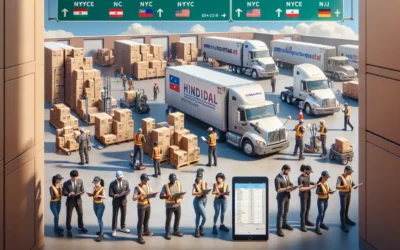Introduction to International Moving: Why It’s Different
Moving your life across borders is a whole different ball game compared to a local move. For starters, when you go international, you’re not just dealing with a moving truck across town. You’re figuring out logistics that involve air or sea freight, navigating customs regulations in your home and destination country, and handling loads of paperwork that you probably didn’t even know existed. This isn’t just moving; it’s coordinating a complex operation where every piece of the puzzle needs to fit perfectly to avoid delays or hefty fines. International moving companies specialize in this kind of operation because they understand the nuances of international laws, language barriers, and the crucial importance of meticulous documentation. Here, we’re not just talking about packing boxes and loading them onto a truck. We’re looking at a scenario where your belongings need to be properly inventoried, valued, and sometimes inspected by customs officials before they can even leave your current country or enter the new one. It’s a process that requires knowledge, precision, and a whole lot of patience.
The Role of International Moving Companies in Your Move
International moving companies are essential players when you’re shifting your life across borders. These companies specialize in the fine art of moving your belongings from one country to another, dealing not just with the physical move but also navigating the maze of customs and documentation required. They act as your guide, ensuring that your items aren’t lost in translation – literally and figuratively. First, they take stock of everything you’re moving, from your grand piano to your tiny teaspoon collection. They pack each item with care, understanding that the journey ahead could be bumpy. Next comes the paperwork, and believe me, there’s quite a bit. From customs forms to insurance documents, international movers know what’s needed and ensure everything is in order for your move. They also liaise with customs officials, smoothing out potential bumps in the process, making sure your belongings clear customs without unnecessary delays or tariffs. Their expertise means you don’t have to lose sleep over whether you filled out a form correctly or if your items meet the import criteria of your new country. In essence, these companies are your move’s quarterback, calling the plays, and making sure the ball – in this case, your household items – reaches the end zone safely.
Preparing for Customs: Essential Documents You Need
Moving internationally isn’t just about packing your belongings and hopping on a plane; it involves navigating through a maze of customs regulations and documentation. Get this: without the right paperwork, your stuff could end up in limbo, or worse, you might face hefty fines. Here’s a breakdown of the essential documents you absolutely need to have in order:
- Passport – No surprise here, right? A valid passport is your golden ticket to cross international borders. Make sure it has enough validity left, ideally more than six months before expiry.
- Visa – Depending on your destination, you might need a visa to legally enter and stay in the country. Check the country’s embassy or immigration website for the specific requirements.
- Work Permit or Residence Visa – If you’re moving for a job or planning to stay long-term, this is crucial. It’s the difference between being a tourist and a resident.
- Inventory List – This sounds tedious, but a detailed list of everything you’re moving can smooth things over with customs. Be honest and specific to avoid delays or questions.
- Insurance Documents – Hope for the best, prepare for the worst. Insurance for your belongings will give you peace of mind and proof of coverage if anything goes sideways.
- Health Certificates – Depending on the destination, you might need vaccination records or health certificates, especially in current times. Better safe than sorry.
- Customs Forms – Each country has its own set of forms for importing personal items. Check in advance what you need to fill out. Doing this early can save you a world of stress.
Remember, each country’s customs and immigration rules can change like the wind, so double-check everything with official sources or get a professional mover who knows the ins and outs. They can handle the red tape so you can focus on the adventure ahead. Safe travels!
Common Customs Regulations and How to Navigate Them
When you’re moving internationally, understanding and navigating customs regulations is key. Different countries have different rules, and it’s your responsibility to know and follow them. To start, most countries require a detailed inventory of items you’re bringing in. This list should be clear, comprehensive, and written in the language or languages required by the customs office. Next, be aware that certain items may be restricted or completely banned, including but not limited to food, plants, weapons, and sometimes even certain types of artwork. To avoid surprises, check the destination country’s customs website or consult with your moving company, as they’re usually up to date on these laws.
Duties and taxes are another critical aspect. The value of your belongings will determine how much you need to pay. Some countries offer a tax exemption if you’ve owned your items for a certain period, usually over six months. Keep receipts and any proof of purchase to show the age of your items if needed. Lastly, always be honest in your documentation. Trying to bypass rules can lead to severe penalties, delays in receiving your belongings, or even legal action. It may seem daunting, but with thorough preparation and by leveraging the expertise of your international moving company, you can navigate customs smoothly.
Packing Tips for International Moves: What You Must Know
When you’re moving across borders, how you pack can make a huge difference. First off, think simple and smart. You’ll want to categorize your items. Start with essentials – things you’ll need immediately upon arrival, like some clothes, personal care items, and important documents. Those go in your carry-on. Then, pack your household items in sturdy, well-labeled boxes. Mark them clearly: “Kitchen,” “Bedroom,” “Kids’ Stuff.” This way, unpacking won’t be a puzzle.
Now, for packing – bubble wrap is your best friend for anything breakable. Plates, cups, picture frames – wrap them up good. Clothes can act as cushions around fragile items, so use them wisely. Books? They’re heavier than you think, so pack them in small boxes. Trust me, your moving team will thank you.
Electronics require special attention. If you’ve kept their original boxes, use them. If not, secure them with plenty of padding and mark the boxes as “Fragile – Electronics.”
Finally, check the climate of your new home. If it’s humid, throw in some desiccants in boxes containing items that might suffer from moisture, like your leather shoes or family photos.
Remember, the goal isn’t just to pack but to pack in a way that ensures everything arrives in one piece, ready for your new adventure. Keep it simple, smart, and secure.
Insurance for International Moves: What Are Your Options?
When moving abroad, many unexpected things can happen to your stuff. It’s a long journey, and accidents or damages can occur. That’s where insurance becomes crucial. Most reputable international moving companies offer two main types of insurance: Full Replacement Value Protection and Total Loss Coverage.
Full Replacement Value Protection is the more comprehensive option. If anything in your shipment gets damaged or lost, the insurance company pays to repair or replace it, based on its current market value. Yes, it costs more, but for peace of mind, it’s often worth it.
Total Loss Coverage is more about the big picture. It kicks in only if everything got lost or damaged, like if the ship holding your container sunk. It’s cheaper but offers less security for individual items.
Remember, not all insurance covers natural disasters or “acts of God.” Always check what’s included. Ultimately, the best insurance depends on your needs, the value of your items, and how much risk you’re willing to take. But don’t skip on insurance; ensuring your belongings are protected is a smart move for any international journey.
Top Tips from International Moving Companies for a Smooth Move
International moving companies have seen it all and they’ve got crucial advice to make your move as smooth as silk. First up, get your paperwork sorted early. This means your visa, work permit, and any custom documents. These aren’t just important; they’re your ticket in. Without them, you’re going nowhere. Next, don’t skimp on insurance. Moving across borders is no small feat, and your belongings are going on quite the journey. Insurance is your safety net. Another golden nugget of advice is to prune your possessions. Seriously, the less you have to move, the easier your life will be. And when it comes to packing, label everything. Not just ‘kitchen’ or ‘bedroom’ but detailed labels like ‘dishes – fragile’ or ‘bed linens’. This will save you a headache on the other side. Lastly, consider timing. Avoid peak moving times like summer and the end-of-year holidays if you can. It’ll save you money and stress. Follow these tips, and you’re in for a much smoother move.
Customs Fees and Taxes: Understanding Your Obligations
Moving your stuff across borders isn’t just about packing and shipping; it’s about dealing with customs fees and taxes too. Every country has its rules, and they can be quite the headache. Think of customs fees and taxes as the entry ticket for your belongings into a new country. They’re not there to make life difficult but to ensure that everything entering the country is accounted for and meets local regulations.
Here’s the deal: the amount you’ll pay in customs fees and taxes can vary widely. It depends on the value of your items, what they are, and their destination country. Some countries have agreements that might lower these costs, but don’t count on it as a guarantee. Electronics, vehicles, and new items often attract higher fees. It’s not just about how much stuff you have but what kind of stuff.
So, how do you keep from being blindsided by these costs? First, do your homework. Research your destination country’s customs policies. Many countries have websites detailing what you can bring in and what it’ll cost you. Second, be honest and detailed in your documentation. Underdeclaring the value of your items or forgetting to list something can lead to fines or even your items being held up. Third, consider working with a reputable international moving company. They’ve been through this rodeo before and can offer valuable advice on minimizing these costs and navigating the paperwork.
In short, while customs fees and taxes might seem like just another hurdle in your international move, with a bit of preparation and the right help, you can tackle them head-on. Remember, it’s all part of the adventure of starting fresh in a new country.
After the Move: Clearing Customs and Receiving Your Belongings
After you’ve moved and your belongings arrive in the new country, the real challenge begins: clearing customs. This step is vital but can seem like a maze. First thing, always check the customs regulations of your destination country well before your move. Regulations can drastically vary, meaning what’s okay in one country might be restricted in another.
When your stuff arrives, you’ll need to present paperwork, often including a detailed inventory of your belongings, receipts for any new or expensive items, and sometimes proof of residence or a work visa in the new country. Be as detailed as possible when listing your items. Customs officials love details and it can speed up the process.
Patience is key. Customs clearance doesn’t happen overnight. Depending on the country and how busy they are, it can take from a few days to several weeks. Also, be prepared for fees. These can include import duties, taxes, and handling charges. The amount depends on the country’s regulations and the value of your items.
Remember, staying organized and having all your documentation ready can make clearing customs smoother. If the process seems overwhelming, consider getting help from a customs broker. They’re experts in navigating this complex process and can offer invaluable assistance.
Final Checklist and Summary: Ensuring a Hassle-Free International Move
Before you set off on your international adventure, go over this final checklist to make sure nothing slips through the cracks. First up, double-check your documents. Ensure your passport has at least six months left before it expires, and that visas, work permits, or residency documents are all in order. Don’t forget about any pet documentation if you’re bringing furry family members along.
Next, confirm your movers. Touch base with the moving company to confirm dates, times, and that all your items are listed. Make sure you have insurance coverage for your belongings during the move.
Also, sort out your finances. Inform your bank of your move to avoid any frozen accounts due to suspicious activity, and check the best way to transfer money internationally.
Lastly, say your goodbyes and familiarize yourself with the customs and culture of your new home. It can help ease the transition for both you and your family.
Remember, a well-prepared move is a smoother move. Double-check this list, keep calm, and welcome your new adventure with open arms.




